The Nobel Peace Prize For Espionage
Hello, would you like to buy something weird? Hammer Time is our guide to things that are for sale at auction: fantastic, consequential and freakishly grotesque archival treasures that appear in public for just a brief moment, most likely never to be seen again.
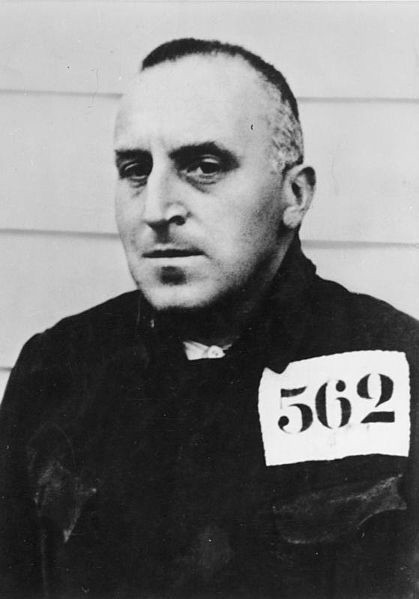
On February 28, 1933, the Reichstag Fire Decree gave Adolf Hitler the emergency powers he needed to suspend civil liberties, and the Nazi party wasted no time targeting political opponents.1
Carl von Ossietzky was arrested by the special police that very morning. It was not the first time the editor-in-chief of Die Weltbühne (The World Stage), the voice of leftist intellectuals, had been in a German prison. After Ossietzky ran an article exposing Germany’s secret rearmament, a clear violation of Treaty of Versailles, he was convicted of “treason and espionage.” He was sentenced to 18 months in Spandau Prison, but was released after seven months for the Christmas amnesty.2
The first time Ossietzky entered a Berlin prison, he was led by a procession of prominent German intellectuals, but many of those dissidents fled when Hitler was appointed chancellor in January of 1933. Philosopher Walter Benjamin lit out for Paris, and scientist Albert Einstein left to visit America and never returned, calling the Nazi takeover a “psychic illness of the masses.”
Ossietzky refused to leave his country, reportedly saying “a man speaks with a hollow voice from across the border.”3 He was an avowed pacifist dedicated to the restoration of “the other Germany,” the one he watched collapse as a soldier during World War I. Reactionaries on the right were actively seeking to amplify Germany’s power and militarism through fascism, and Ossietzky was determined to challenge them at every step.
This time, however, the Berlin prison did not release Ossietzky to freedom. Hitler hurriedly established concentration camps to imprison nearly 45,000 political opponents. Ossietzky was first sent to the Sonnenburg concentration camp shortly after it opened, and later Esterwegen.
In the camps, Ossietzky was subjected to hard labor and tortured, deprived of medical attention, forced to live in unsanitary conditions, and deprived of adequate sustenance. According to fellow prisoners, he suffered a heart attack, but the forced labor continued.4
By October of 1934, a small but notable group of European intellectuals began calling themselves the Freundeskreis Carl von Ossietzky. They launched a letter-writing campaign on the pacifist’s behalf. William Butler Yeats declined to get involved, asserting “he never meddled in political matters,” especially those outside of Ireland. But Virginia Woolf, Aldous Huxley, and Rose Macaulay readily showed their support.
Few believed Ossietzky would be freed. The Freundeskreis hoped that the editor’s plight would force the world to acknowledge the atrocities in Nazi Germany. The Third Reich was just a year old, and many still believed, or chose to believe, that Hitler could be reasonable.
When the letters received little response, the campaign took on a more specific goal: The Nobel Peace Prize. Romain Rolland sent a letter of support to Oslo, asserting the committee “has never before had the opportunity to crown an apostle of peace who had remained true to his cause until martyrdom.” But as a recipient of the Nobel Prize for Literature, Rolland could not nominate Ossietzky.
Albert Einstein, who had won the Nobel Prize for Physics, wrote to the committee as well. He was teaching at Princeton, and focused his efforts on American recipients of the Nobel Peace Prize, hoping he could convince them to nominate Ossietzky. Among others, he wrote to Jane Addams, the first American woman to win the Nobel Peace Prize.5 The founder of Hull House was a well-known pacifist, and immediately cabled a nomination to Oslo.
On July 10th, Profiles in History will auction off a letter of appreciation written by Einstein, with a starting bid of $6000.
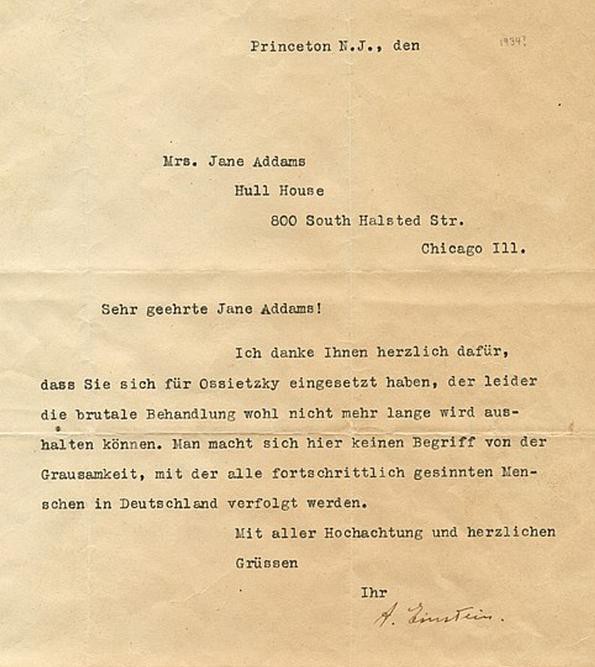
Dear Mrs. Jane Addams!
Thank you so much for supporting Ossietzky, who unfortunately won’t be able to endure the brutal treatment much longer. People here cannot imagine the cruelty suffered by all progressive people who are being persecuted in Germany.
Yours respectfully,
Einstein
In addition to laureates, the group also lobbied Norwegian politicians and other nominees shortlisted for the prize. Czech President Tomáš Masaryk, considered the frontrunner, was convinced to show support for Ossietzky, but no committee member dared to push the nomination through.
In 1935, there was no Noble Peace Prize awarded. The committee, afraid to offend the new regime, announced they would exercise their right to reserve the prize for the following year.
After the announcement, Norwegian Nobel Laureate Knut Hamsun published a pro-German attack on Ossietzky. The essay incensed other writers, liberals, labor groups, and students, who actively took up Ossietzky’s cause. Back in Paris, Freundeskreis sought to capitalize on the controversy. They made Ossietzky’s writings on peace widely accessible to Nobel laureates, along with a memorandum arguing that he deserved the prize for peace, and it was not an attempt to free him. In response, Oslo received a record-breaking number of nominations from 86 laureates in 11 countries.
With the 1936 Berlin Olympics rapidly approaching, the Nazi regime’s effective propaganda campaign was being hijacked by Ossietzky. His imprisonment was not only a distraction, but it brought attention to concentration camps. When the Red Cross insisted they be allowed to visit Ossietzky, Hitler felt obligated to agree.
Swiss diplomat Carl Burckhardt was sent to visit Ossietzky, who he found gravely ill with tuberculosis. In his report, Burckhardt described him as “a trembling deadly pale something, a creature that appeared to be without feeling, an eye swollen, teeth apparently smashed, it dragged a broken, badly healed leg… a human being that had reached the uttermost limits of what can be borne.”
The German government feared that Ossietzky would die, and made a great show of sending Ossietzky to a prison hospital. Following the lead of the Freundeskreis, the Nazis pressured Nobel laureates to write to the committee as well — in support of Baron Pierre de Coubertin of France, who founded the modern Olympics. They also challenged the assertion that Ossietzky had ever been advocate of peace, disseminating anti-Ossietzky materials at home and abroad, including a fabricated interview in which Ossietzky proclaims, “Heil Hitler!”
The advisor who drafted the original report on Ossietzky assured the committee the documents were falsified, but many of the members took Germany’s threats seriously. Halvdan Koht, the Norwegian Foreign Minister who sat on the committee, withdrew from deliberations. The Prime Minister, Johan L. Mowinckel, left shortly after.
In 1936, the committee nonetheless announced Ossietzky was indeed awarded the previous year’s Nobel Peace Prize. In his speech, committee chairman Fredrik Stang made it clear they were not disapproving of the Nazi regime, and made no mention of the concentration camps, concluding: “In awarding this year’s Nobel Peace Prize to Carl von Ossietzky we are therefore recognizing his valuable contribution to the cause of peace — nothing more, and certainly nothing less.”
Nazi Germany, however, read the award as a direct critique. The Reich formally complained to the Norwegian government, and Hitler sent Hermann Wilhelm Göring to deal with Ossietzky in the prison hospital.6 The Gestapo, which Göring founded in 1933, argued that even if they accompanied Ossietzky to Oslo, he might escape, and would most definitely use the prize money to speak out against Germany. Instead, Göring offered Ossietzky a deal. If he rejected the prize, the German government would offer him freedom and a pension. Ossietzky proved more determined than ever, declaring, “I was a pacifist, I remain a pacifist.”
The German Propaganda Ministry publicly declared that Ossietzky was free to accept the award, but denied him the passport to do so. The Nobel committee sent the prize money to Germany, which was promptly stolen by Ossietzky’s lawyer.7 The German press was forbidden to comment on the prize, while the government proclaimed that all future German nominees were obligated to reject it.8
Ossietzky was moved to a private sanitarium, where he clung to life for another 17 months. The Gestapo guarded his room, regulating correspondence and visits.
On May 4, 1938, Ossietzky died from tuberculosis and other injuries resulting from three years in concentration camps. That same year, Time named Hitler “Man of The Year.”
In 1990, Rosalinde von Ossietzky-Palm called for her father’s high treason and espionage conviction to be reopened. Two years later, Germany’s Federal Court of Justice upheld the 1931 ruling, stating:
According to the case law of the Reichsgericht, the illegality of covertly conducted actions did not cancel out the principle of secrecy. According to the opinion of the Reichsgericht, every citizen owes his Fatherland a duty of allegiance regarding information, and endeavors towards the enforcement of existing laws may be implemented only through the utilization of responsible domestic state organs, and never by appealing to foreign governments.
While that ruling was unfortunate, just last week Julian Assange said that the new “mark of international distinction and service to humanity” was not the Nobel Peace Prize, but rather an indictment for espionage. 9
1. The February 27, 1933 arson attack on the Reichstag building, which housed the German Parliament, enabled the Nazis to become the majority party. Hitler had become the Chancellor of Germany just four weeks before the fire, but the mass arrests of Communists and other political opponents allowed him to greatly consolidate his power.
2. He had been the editor of the article, but the writer was Walter Kreiser. He was convicted and sentenced to 18 months in prison as well, but fled Germany. While Ossietzky did not appear to show any particular attachment to Christmas, his parents were Catholic and Protestant.
3. Biographer Wilhelm von Sternberg has speculated that Ossietzky, given a few more days, would have fled as well. Given Ossietzky’s contention that his voice would lose potency outside of Germany, compounded with a later offer of freedom that he rejected, suggests that the Sternberg’s suggestion was a highly debatable opinion.
4. In 1934, Heinrich Himmler’s SS took over the concentration camps and began purging Germany of “racially undesirable elements,” including Jews, criminals, gay men and women, and Gypsies.
5. Addams had won the prize in 1931 for her “expression of an essentially American democracy,” and donated the money to the Women’s International League for Peace and Freedom. She was regarded as the most prominent woman reformer of the Progressive Era, helping bring attention to women’s issues.
6. Hitler would name Göring as his successor in 1941.
7. The German government sentenced the lawyer to two years of hard labor for embezzlement, and forced the gravely ill Ossietzky to attend the show trial. It would be his last public appearance.
8. The proclamation would prevent three German citizens from accepting their awards: Richard Kuhn and Adolf Butendant won the Nobel Prize in Chemistry in 1938 and 1939, and Gerhard Domagk won the Nobel Prize in Physiology or Medicine in 1939. The committee would eventually reissue their certificates and medals, but not the prize money.
9. Assange, who is wanted for espionage, wrote, “It is getting to the point where the mark of international distinction and service to humanity is no longer the Nobel Peace Prize, but an espionage indictment from the U.S. Department of Justice.” He was referring to Edward Snowden, who is the eighth person to be charged with espionage under President Barack Obama. Widney Brown, Senior Director of Amnesty International, worries that Snowden’s “forced transfer to the USA would put him at great risk of human rights violations and must be challenged.”
Alexis Coe is now a writer living in San Francisco, but not long ago, she was a research curator at the New York Public Library. Her work has appeared in the Atlantic, Slate, The Millions, The Hairpin, and other publications. Alexis holds an MA in history. Follow her.
New York City, June 26, 2013

★★★ The low-amplitude heat wave rolled on, without crest or breaking point. The kindergarteners lined up at their final dropoff, in t-shirts and shorts. The playground fountains were off, but they had washed the concrete map of the United States into bright color again. Air conditioners splattered a heavy dripline along 70th Street. How to blot the moisture without wiping off sunscreen? The subways went bad before the streets did; the 72nd Street platform was like a dead-end exhaust vent, local and express both holding there, both squeezed full of people. Downtown, bicycles chattered along in little packs, and the Citi Bike rack was nearly empty. On a side street, a cool breeze slid under the leaves. The air conditioning in the office made knees stiffen up. Downtown had not changed all day, but Lincoln Square was overcast at the end of the train ride, heavy clusters of gray broken by an occasional sliver of blue if you tried to find one. Quietly, in the time it took to cook dinner, the pavement ended up wet and puddled. The sun, peeping out from under a ragged edge of cloud, looked like something from an airbrushed devotional poster. Then it emerged entire as something eerier and more stirring, flame orange haloed with a penetrating magenta, slowly descending.
Stars, "Hold On When You Get Love And Let Go When You Give It"
https://www.youtube.com/watch?v=EaRQV9vcIRs
I don’t want to bring anyone down, but Stars’ “Elevator Love Letter” is ten years old. It is still pretty much a perfect song and certainly a crowning achievement, so even if they haven’t done anything as good since then it’s hard to see how they could have. Which I guess is why they decided to turn into New Order, as they’ve done here. Enjoy. [Via]
New York City Was Revolutionized Last Night
by Brendan O’Connor
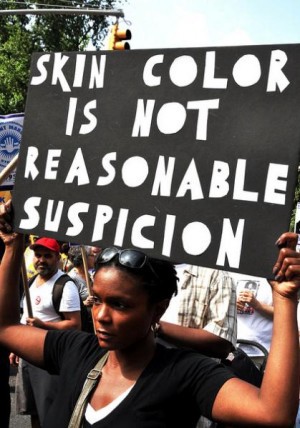
“Remember the 1990s? We’re going back,” said Councilman Peter Vallone last night. We remember! Sounds great.
New York City’s Community Safety Act was made up of two bills: one that would expand New Yorkers’ ability to sue the Police Department for profiling, and one that would increase government oversight of the department. Last night both passed with a veto-proof majority just after 2:20 a.m., at which point Councilman Jumaane D. Williams, who introduced the bill with Councilman Brad Lander last year and spoke movingly in support of it, jumped up from his chair and pumped his fists.
But before the victory, everyone mixed it up a little. Williams criticized those who would oppose the End Discriminatory Profiling Act, arguing that opponents of the bill did not represent constituencies directly affected by the police practices it is written to ameliorate. “The vast majority who I know are planning to vote against 1080 do not represent the people who deal with gun violence in their communities,” he said. “If you don’t live there, if you haven’t lived through it, if you don’t represent these communities — please, side with us.” The majority of the City Council’s black and Latino caucus supported the CSA.
“Historically there has been a paternalistic response to these communities saying what they need,” Williams continued. “Pay us the same respect that we pay you.”
Charles Barron, who was up in the balcony shaking hands and joking with supporters when roll was called, spoke with a cheerful rage that contrasted with Williams’ quiet passion. “When the mayor doesn’t like it and the commissioner doesn’t like it, it has to be good for the City of New York,” he said. Barron voted in support of both CSA bills — but he voted no on the budget. Both these bills and the budget for the next fiscal year were voted on simultaneously. (The budget passed as well.)
“The budget sometimes is more brutal than the police,” Barron said. “We need to look at this budget as diligently as we look at stop-and-frisk.”
Opposition to the Community Safety Act was led by Councilmen Peter F. Vallone, Jr. and Eric Ulrich. (When we last met Vallone, he was shilling for Big Foam, and before that, Big People Who Hate Awls. Now he rests snugly in the pocket of Big Civil Rights Violations.)
“When the courts are in charge, we will become Chicago. We will become Detroit,” Vallone said. “Children will die.”
“It’s not fear-mongering if it’s true,” he said.
Councilman Barron questioned his credentials as a champion of the public good. “I have spent my life keeping New York safe from people like you,” Vallone said.
“It’s an election year,” said his buddy Ulrich. “We all want to pander… Give me a break. I will not be intimidated by the professional police critics, by the panderers, by the media. This is an outrage.”
Ulrich is a Republican from Queens and the youngest member of the City Council. “Instead of criticizing the job the cops have done,” he said, “we should be thanking them for a job well done.”
“I wanna live in a safe city,” he said. “I wanna live in a city that is safe from fear.”
Councilman Donovan Richards, who represents neighborhoods in Brooklyn and Queens, also expressed a desire to live in a city that is safe from fear, describing the panic he felt, starting at the age of 16 when he was first stopped-and-frisked, whenever a police cruiser would appear in his rear-view mirror.
With the passage of CSA, however, things are changing. “Today, I’m not scared. Today, I’m elected,” Richards said. “And I have a chance to do something about it.”
Struggling author, mayoral candidate and Council Speaker Christine Quinn split her support, voting ‘yes’ on the Oversight Act and ‘no’ on the End Discriminatory Profiling Act. “Some have suggested that putting this type of monitoring in place will make the city less safe,” she said, going on to note that crime has dropped 38% and police approval has risen 84% following passage of similar legislation in Los Angeles. “One thing that will make this city less safe is if New Yorkers feel at odds and not united with their police department.”
Yet she still voted no. Quinn fears that the End Discriminatory Profiling Act would allow for too much judicial involvement. Worth noting: her support for the Oversight Act, at least, is a significant break from her Bloomberg lineage.
“I hope this ends in time for brunch,” said Brad Lander late last night. It did. Because in other legislative news, the War on Brunch is over. Sidewalk cafés may now serve before noon. What’s next — mandatory sick leave for New York employees? Oh yes: the Council voted to override Bloomberg’s veto on that too. Last night was an evening of radical change for the city, so, congratulations.
Brendan O’Connor is an Awl summer reporter
. Photo by Michael Fleshman from the demonstrations last year that have led to these changes.
Who's Endorsing Whom? A Complete Guide To New York City's Mayoral Race
by John Stillman
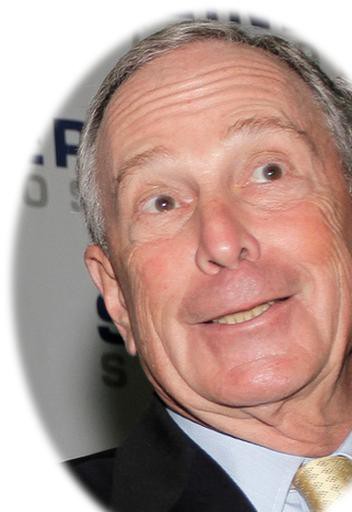
As the candidates for mayor of New York City narrow in on the primary elections, the mad dash for endorsements is only getting more cutthroat. Pollsters and pundits are closely monitoring the trade winds of public opinion, but with Cyndi Lauper continuing to withhold her endorsement (she tipped the scales for Bloomberg in 2009), the conversation is woefully unsubstantiated.
So here is a list of everyone we think relevant, from the teachers’ union to Lady Bunny, from Ingrid Sischy to Marv Alpert to Plumbers Local 1.
The primaries are set for September 10th, and then, just under two months later, New York City will finally elect a mayor who isn’t Mike Bloomberg. It’ll be over before you know it. We’re going to do this in alphabetical order, just to be polite.
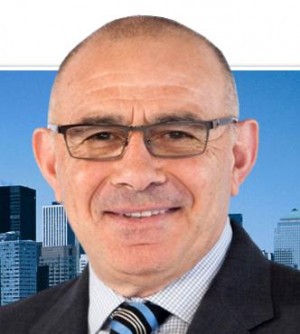
SAL F. ALBANESE
The former New York City councilman has launched his underground campaign. Keep an eye out for Mr. Albanese next time you ride the 2, 3, 4 or A, where he was recently mistaken for a Mormon..
• Paul Murphy, the MTA Bridges and Tunnels manager
• Uniformed Firefighters Association PAC

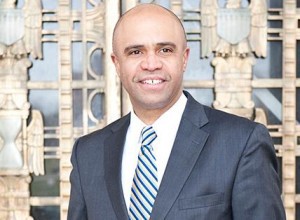
ADOLFO CARRIÓN JR.
Former Borough President of the Bronx, Carrión lives on City Island and once enjoyed a coconut ice on a hot day. The Independence Party’s endorsement ensures that he’ll be on the November ballot.
• Michael Reagan (of Ronald Reagan fame/parentage) urged the GOP to let him enter their primary

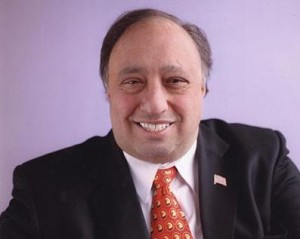
JOHN A. CATSIMATIDIS
The son of a lighthouse operator in Greece moved to West Harlem as a boy, started a grocery chain, and now he’s worth $3 billion, basically; proponent of limiting street-vendors’ location options.
• Liberal Party of New York (after previously supporting Tom F. Allon, who withdrew)
• Craig Eaton, Brooklyn Republican Party chairman
• Phil Ragusa, Queens Republican Party chairman
• Dan Isaacs, Manhattan Republican Party chairman
• George E. Pataki, former governor of New York
• Andrew Lanza, New York State Senator
• Luis Fortuño, former governor of Puerto Rico
• Vito Fossella, former U.S. representative from Staten Island

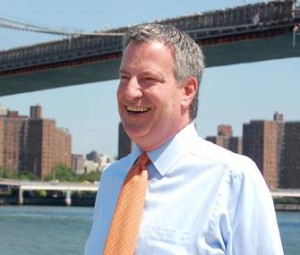
BILL DE BLASIO
Husband of Chirlane, father of Chiara and Dante, brains behind the Worst Landlords Watch List. As the Journal insightfully points out, Sarah Jessica Parker’s endorsement confers on de Blasio all the trappings of Obama.
• Alec Baldwin
• Cynthia Nixon
• Alan Cumming
• Sarah Jessica Parker
• Russell Simmons
• Michael Musto
• Lady Bunny
• Steve Buscemi (protested firehouse closings alongside de Blasio, was arrested)
• Debbie Harry
• Service Employees International Union Local 1199, New York City’s largest union
• Ruth Hassell-Thompson, state senator from the Bronx (Wakefield)
• Luis Sepulveda, state assemblywoman from the Bronx (Parkchester)
• Bay Ridge Democrats
• CWA District 1
• Barack Obama Democratic Club of Upper Manhattan
• New York Communities for Change, progressive group
• Independent Neighborhood Democrats
• The New Kings Democrats
Donors:
• Paul Simon
• John Turturro
• Amy Sohn
• Gregory Dinallo (writer of “Walker Texas Ranger,” “Knight Rider,” others)
• Warren Eisenberg, CEO of Bed Bath and Beyond

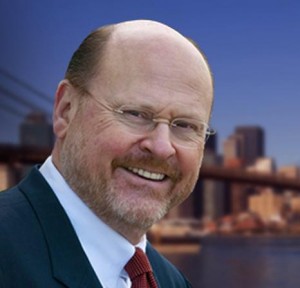
JOSEPH J. LHOTA
Here, try out this montage of Lhota doing classic New York Stuff all over New York City. In slow-mo. With the tagline “Joe Is New York.”
• Steve Schirripa (The Sopranos)
• Martin Golden, State Senator
• Peter T. King, U.S. representative, 2nd congressional district
• Michael Grimm, U.S. representative, 11th congressional district
• All four Republican members of the New York City Council: James Oddo and Vincent M. Ignizio of Staten Island, and Eric Ulrich and Daniel J. Halloran III of Queens
• Rudolph W. Giuliani, former mayor
• Bronx County Republican Party and Jay Savino, its chairman
• Staten Island Republican Party
• Charlie Gasparino, Fox Business Network reporter, deputy mayor during the Giuliani administration
Donors:
• Mitchell, Robin, and Ashley Modell (CEO of Modell’s and family)
• The Dolans (Cablevision, hell)

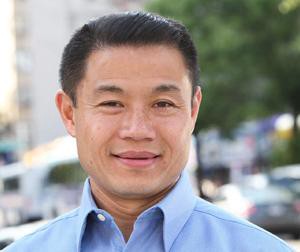
JOHN C. LIU
Currently serving as comptroller (that is, the one responsible for the city’s finances), Liu is charging ahead while the FBI takes an interest.
• Boilermakers, Cement Masons and Insulators unions
• Plumbers Local Union 1
• CWA Local 1180: Communication workers, public sector
• DC 37: NYC’s largest municipal public employee union
• National Organization of Women (Brooklyn-Queens Chapter)
• Central Brooklyn Independent Democrats
• Staten Island Democratic association (and Dem. Org. of Richmond County, South Shore Democratic Club; basically, Staten Island Democrats)
• Manhattan clubs: Downtown Independent Democrats, Three Parks Independent Democrats, and Village Independent Democrats
• Peter Koo, city councilman from Flushing
• Inez Barron, state assemblywoman

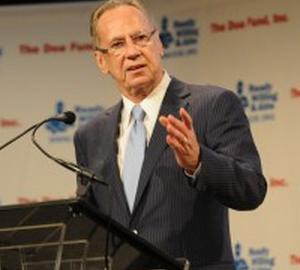
GEORGE T. MCDONALD
The founder of the Doe Fund has business smarts and a record of charitable deeds, but he lacks endorsements. For what it’s worth, Mayor Bloomberg donates to his organization.

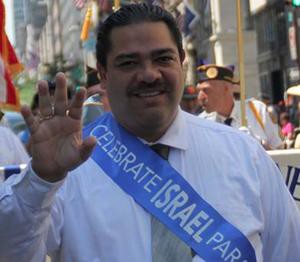
ERICK J. SALGADO
The minister and radio personality brings socially conservative views and Staten Island swagger to the Democratic primary.
• State Senator Ruben Diaz Sr. (his son is endorsing Thompson!)
• Rev. Hector Crespo, President of Clergy for Justice
• Joseph Hayon, a Jewish activist and former Assembly candidate

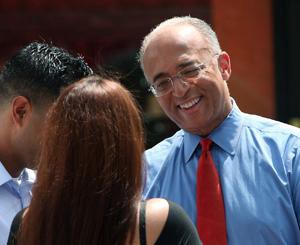
WILLIAM C. THOMPSON JR.
The former Comptroller ran for mayor in 2009, bagging the Obama endorsement, as well as the endorsements of his current opponents Weiner, Liu and de Blasio.
• Rev. Floyd H. Flake
• Rep. Charles Rangel
• Former Mayor David Dinkins
• Rubén Díaz, Jr., Bronx borough president.
• Karim Camara, state assemblyman from Brooklyn, leader of Albany’s black, Hispanic and Puerto Rican caucus
• Herman D. Farrell, Jr., state assemblyman, former head of the Manhattan Democratic Party
• Richard Ravitch, former lieutenant governor of New York
• Gregory Meeks, U.S. representative, 5th congressional district
• José E. Serrano, U.S. representative, 15th congressional district
• José M. Serrano, state senator
• Al Sharpton endorsed him in 2009, but has not yet endorsed
• United Federation of Teachers
Donors:
• George W. Haywood, former Managing Director for corporate bond trading and Proprietary Trader at Lehman Brothers
• Mannie Jackson, chairman and owner of Harlem Globetrotters (played on team 1962–1964); first African American with controlling ownership in an entertainment organization and international sports
• Cynthia Bailey (model, donated in 2009)
• Nicholas Kalikow (documentary film producer)

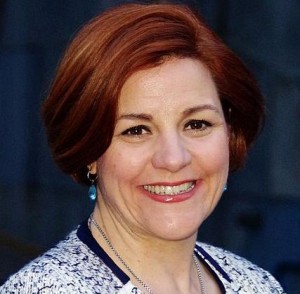
CHRISTINE C. QUINN
The longtime front-runner — anointed as the “obvious” candidate — has Hollywood in the palm of her hand, sort of. But the most recent poll, showing a three-way heat between Weiner, Quinn and Thompson, suggests that having cool friends might not be the most effective way to win an election. Often perceived as billionaire mayor’s sockpuppet.
• Brooke Shields
• Whoopi Goldberg (held a fundraiser at her home)
• Edith Windsor, DOMA plaintiff
• Candice Bergen
• Christopher Albrecht, the CEO of Starz
• Rob Reiner
• Ingrid Sischy
• Stephanie March (“Law & Order: Special Victims Unit”)
• Joanna Coles, editor in chief of Cosmopolitan
• Mario Batali
• Congressmember Joe Crowley
• State Assemblymembers Edward Braunstein, Michael DenDekker, Andrew Hevesi, Margaret Markey, Michael Miller, Francisco Moya, Catherine Nolan, Michael Simanowitz, Aravella Simotas and David Weprin.
• Gustavo Rivera, state senator
• Matthew Titone, state assemblyman
• Dan Quart, state assemblyman
• Carolyn Maloney, U.S. Representative, 12th congressional district
• Marty Markowitz, Brooklyn borough president
• Gloria Steinem, feminist writer and activist (conditional support?)
• (the late) Edward I. Koch, former mayor of New York City
PACs and Unions
• United Auto Workers (UAW)
• Lambda Independent Democrats (LGBTQ focused)
• The National Organization for Women of New York City (NOW-NYC)
• Democratic Organization of Queens County
• Gay & Lesbian Victory Fund
On the fence:
• Goldman Sachs Chief Executive Lloyd Blankfein declined to endorse Quinn but said she “wouldn’t be bad”
• Salman Rushdie: “I guess Quinn will win, and I don’t mind…. I’m OK with it.”
Donors:
• Anna Wintour
• Harvey Weinstein
• John Bongiovi (of Bon Jovi)
• Terry Semel (former Yahoo! Inc. Chairman and CEO)
• Ashley Olsen
• Bobbi Brown
• Louis Susman (former US Ambassador to the UK)
• Ronald Meyer (President/COO of Universal Studios)
• Brett Ratner
• Thomas DiBenedetto (partner in Fenway Sports Group, owner of Boston Red Sox)
• Maria Cuomo Cole (executive producer of The Invisible War)
• Laura M. Ricketts (co-owner of the Chicago Cubs)
• Ari Emanuel (talent agent, co-CEO of William Morris Endeavor)
• Jeremy Stoppelman (Yelp CEO)

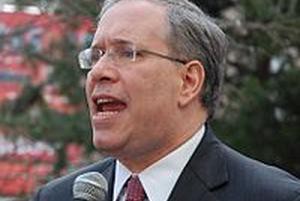
SCOTT STRINGER
He’s running for comptroller instead. But here’s who he had.
• Scarlett Johansson (her twin brother Hunter worked in his office and her grandmother worked with him in the 1980s)
• Lady Gaga’s father, Joe Germanotta (Lady Gaga thanked Stringer for defending her honor after James Molinaro called her a slut)
• Larry Gagosian
• Sigourney Weaver
• Nanette Lepore
• He’s got a lot more in his new race

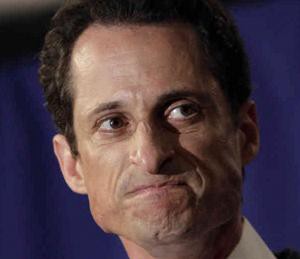
ANTHONY WEINER
Weiner Weiner Chicken Deener!
• Keith Ellison, U.S. representative from Minnesota (unsolicited, with the lead-in, “Look man, nobody here is perfect”)
Donors:
• Marv Albert
• The Yankees

John Stillman is an Awl summer reporter.
Coffee Hut Named After Boobies Accused Of Doing Bad Thing
When a business is named Java Juggs can anyone really be surprised that it may be providing sexual services?
A Poem By Lo Kwa Mei-en
by Mark Bibbins, Editor
Babel / Aubade
After the aftermath of that hard-spent spring how will I break
thee is the question. Pin down in the dark and halt. All the horses
strained to the flickering ropes in the trees and restrained. Or lay
crack the gardens oh freak violet were we. The horses rode after me
after. The bats were a miracle with legs I saw to say how could you.
And even though the new world got brave out of doors I shut &
all the aftermath is all I want. (Twice.) All night you take a bride
chest in thy swanny clutch I want in: wanting out is why we change
the lock on each other but I want to door. Do I wed the key word
‘want’ for nothing but to find thee on the other side? I wake wanting
more than I did before. And I do. Thy heroic thy horses be damned.
Thy hurt. A kingdom for my gully· my crossroad for a truly hard
up king· my good hilt stacked to do my saying for me. Tower
kicked is the mathy after so you lay finger to my violent fruits
rolling in a hot hay. Hey after the hallelujah I cut clean in half and
you check thy pulse with a reason. The legend screws us like we came
together in a loving tongue so I unscrewed it torched it. Don’t wait
for what comes next. Tell it fast so my borders lit. All the horses
rang out in arson. The stable was a carousel it played thy name
run for its life out the burning door, out the last unbearable
and troubled light.
Lo Kwa Mei-en is the author of Yearling, forthcoming from Alice James Books.
If you’re having poem problems I feel bad for you, son. I got 99 poems but — actually, I’ve got way more than 99 poems. They’re all here, in The Poetry Section’s archives. As you were. You may contact the editor at poems@theawl.com.
Guy Is Actually Bigger Dick Than Antonin Scalia: Report
Supreme Court Justice Samuel Alito is a real dick. Plus, he’s rude in court.
Two-Headed Turtle Has Two Heads, Is Turtle
“She seemed like she had a split personality,” says a zoo curator, which scientists speculate may have something to do with the fact that instead of the normal one head that most turtles have, there are two of them. [Earlier: Two-faced cat has two faces, is cat]
If You Were Having A Hard Time Ordering Your Human Nest Here's Why
“A listing last Thursday with an article about nests built for human habitation misstated the Web address for Jayson Fann, who builds such nests. It is bigsurspiritgarden.com.”
